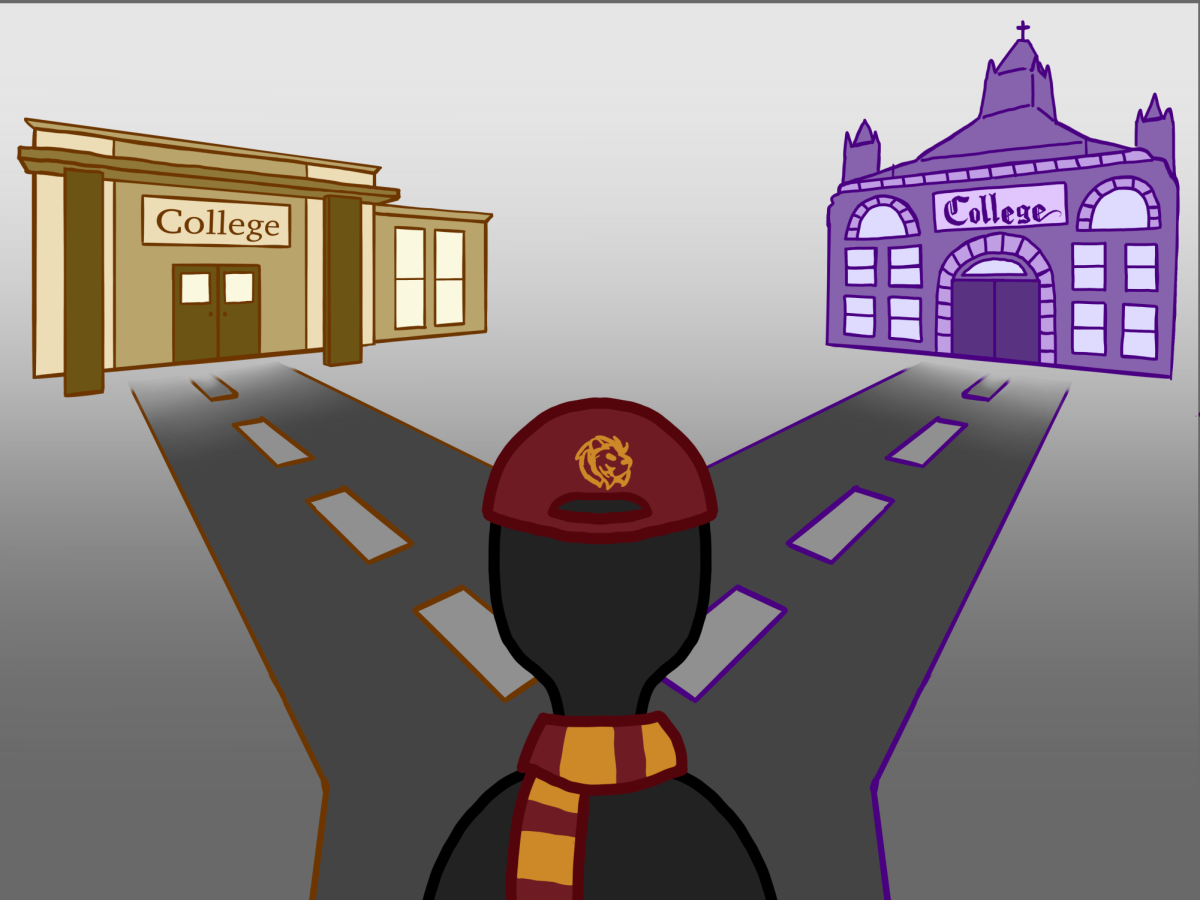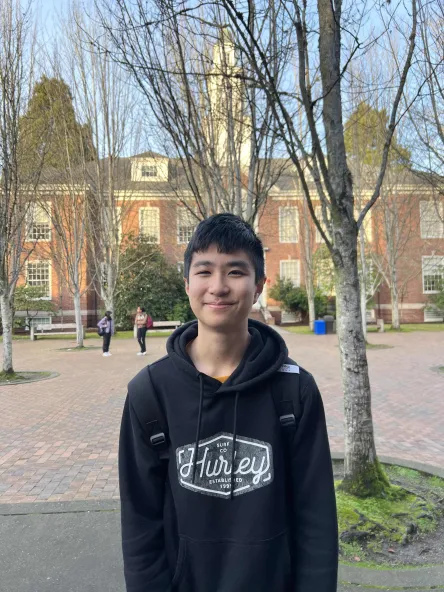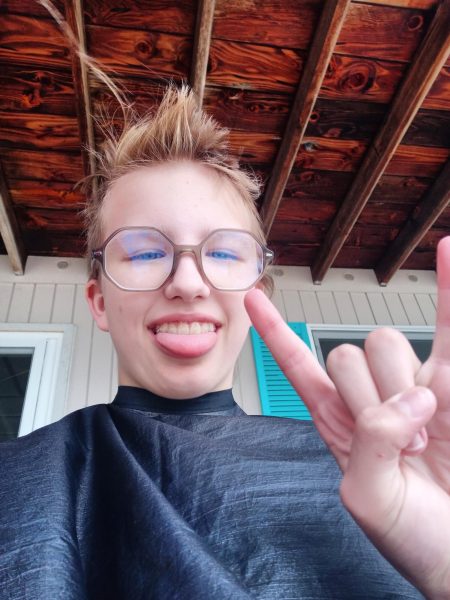Everybody asks where you are going to college. But nobody asks if you are going to college. Lakeside, as an institution, is known for its competitive and college-obsessed environment — it goes without saying that attending college is the norm. But why is this the case? In order to answer this very question, I interviewed Lakeside college counselor Ari Worthman.
On our transcripts, there is a little note in the top-right that often goes unnoticed, but is incredibly interesting: 100% ATTEND COLLEGE.* Mr. Worthman clarifies that “100% of our students intend to get a college degree at some point.”* If a student takes a gap year after high school, attends college as an adult, or goes to community college, they count in this percentage.
This means that every single Lakeside student from the 1910s all the way to the recently graduated seniors in the class of ’24 has gone to college at some point in their life. And whether you are a senior in the class of ’25, a junior, a sophomore or a freshman, chances are you will go to college too.
This is a uniquely Lakeside phenomenon. The average college attendance rate for private schools in the United States is 64.5%. When looking at all schools nationwide, the average rate of college attendance drops down slightly to 61.4%. When looking at all schools around the world, the rate of college attendance drops starkly down to just 7%. So, essentially Lakeside is an anomaly inside an anomaly inside an anomaly.
But this is not an outlier; this is a structurally crafted outcome. “The culture of the school right now attracts families and students who value education and see college as an important goal,” says Mr. Worthman. As the most selective private school in Washington, Lakeside is a training ground for “ambitious, talented, and driven students.” Families who spend the effort to apply to and pay for a private high school will likely value education enough to apply for college.
Furthermore, Lakeside is no doubt more wealthy than an average high school. So, there is less of a financial burden on families who choose to attend college, it is more of a simple choice for Lakeside students rather than a financial commitment for students in other US schools.
However, the rate of college attendance is just one piece of Lakeside’s college enigma. To grasp the full picture we have to look at the specific colleges Lakeside students go to.
Out of the over 150 students in the class of ’24, only 10 students went to the University of Washington, even though a much higher percentage of college-attending Washingtonians attend the University of Washington. As an in-state college, it is affordable, it is close to home, and it is an academically strong college. Yet, despite these automatic benefits for Washington residents, 93% of Lakeside students still choose to venture outside of Washington in search of an even better opportunity.
Where are these better opportunities? The closest contender to the UW unexpectedly is MIT, with nine class of ’24 students enrolling in this college. It is not rare for Lakeside students to attend selective colleges. In fact the average acceptance rate of the colleges attended by the class of ’24 averages around 16.2%.
For some, it’s about setting themselves up for success financially: “a prestigious college … opens doors — more internships, more connections, and potentially higher-paying jobs later on,” Mr. Worthman notes. There is a deeply ingrained idea that by attending a selective college, you gain a credential that is trusted by employers. This mindset that going to a college is conducive to a good career is a highly probable reason for Lakeside’s abnormally high college attendance rate. This is starting to change, as Mr. Worthman notes, because “there are lots of questions nationwide about what exactly the value of a college degree is and is it even really necessary.” But for now, a selective college education is a valuable prospect that many Lakeside students are pressured to study hard for.
There was one such student who was accepted to both Bowdoin and Yale. She visited both of the schools and liked Bowdoin more — there are smaller class sizes and it felt more like a community. A few years ago she graduated with a degree from Yale. Why did she choose Yale even though she liked Bowdoin better? Because Yale was a big name “prestigious” school.
This is not an isolated incident. Many students feel pressured to attend prestigious colleges even if there are less known colleges that they like more and are less expensive. In fact, around 72.6% of college students in the United States attend a public institution. In comparison, only 20% of the class of ’24 enrolled in a public institution.
With that said, whether you choose to go to a private or public college, there are more paths to getting a degree than the traditional four-year path most people go through.
Community colleges can provide a really great education at a much lower cost compared to four-year colleges. They often offer more flexibility, allowing students to work part-time while studying and attend classes at their own pace. So even just with a community college education, there still is a pathway for stable employment.
Mr. Worthman believes that community colleges offer a pathway to transfer to a four-year institution. You can start at a community college, complete your first two years, and then transfer to a selective college. He believes that “the best way to experience the real world actually is by starting out of community college. It is perhaps arguably the most diverse set of people you would engage with in a classroom.”
Mr. Worthman says, “I would like to see more students doing gap years and taking some time off and doing some cool things. I think it’s really healthy. And there’s a lot of growth and actually a lot of research that shows that students that take gap years outperform students that don’t.”
One such Lakeside alumnus, Royce Pearson, was extremely talented and well-connected. By the summer after graduation, he was doing well. Instead of going to college immediately, he decided to simply start his career in theater instead. Another Lakeside alumnus took a gap year and lived with Buddhist monks for a year. He didn’t do it to get a better job or look better on his resume. He did it because he thought it would be an enjoyable experience.
And that’s the big idea. Deciding to go to college shouldn’t be a competition — it should be about finding a place where you can learn, grow, and pursue your passions. That doesn’t have to be college. It can look like something else.
Mr. Worthman believes that success means different things to different people. For some, it’s financial stability, while for others, it’s pursuing what truly makes them happy: “The question is, what is happiness for you? And really examining that and that sort of determines to what extent you would be happy with or without a college degree.”
Not having a college degree doesn’t make you a failure. Having one doesn’t make you a success. Life is more complicated than that. Success is also complicated, but at its core is living a personally fulfilling life. “A lot of our students feel this pressure to conform to the traditional path, but it’s important to understand that there are many paths to get where you want to go,” says Mr. Worthman. Life is not a race to the top, but a journey to find meaning every step of the way. So figure out what matters most to you, even if it means taking the road less traveled.
* “100% ATTEND COLLEGE” does not mean that every Lakeside student attends a four-year college immediately after graduation. Some students who take gap years, attend community college, enroll in college later in life, or simply don’t attend college. However the students who attend college constitute an overwhelming majority, so that the percentage can simply be rounded up to 100%.



